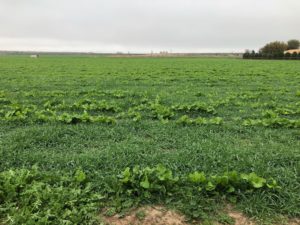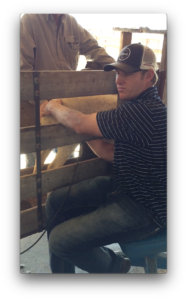Winter is Coming, Are You Ready?
As I write this, we are supposed to get our first hard frost. It is mid-November and the late summer and fall moisture has produced a lot of winter forage. Be sure to keep a close eye on what has grown in the pastures.
As was discussed last month, some warm season weeds were produced that can be toxic to sheep and goats. Now, most of these plants have withered or the animals have learned to avoid them, especially if there is abundance of favorable forages.
It appears to be a great year to grow cereal forages crops, such as wheat, oats, and triticale. These are fantastic crops for sheep and goats to grow out fall- and winter-born lambs and kids. Hopefully, the winter (December, January, and February) markets for lambs and kid goats returns to normal highs. It is especially important to provide minerals that are specifically designed for cereal crops. Magnesium deficiency is something we want to watch for in livestock grazing small grains. Providing the animal with a free-choice loose mineral or hay will usually supply enough magnesium to meet the necessary levels in the animal.
There has been quite a lot of interest in cover crops and diverse winter forages. Below is a photo of triticale and turnips they are growing for winter forage. For years, ranchers in Northern states have used sheep to harvest beet tops, prior to harvesting the sugar beets. Not only could these crops increase forage volume and diversity but the could also improve soil health. If you have experiences with highly productive forage varieties, share them with us. We’d love to hear of your experiences.

For range operations that lamb or kid in the spring, winter can be a slow time of the year. I encourage operations to consider testing for pregnancy status via ultrasound and/or body condition scoring females. These practices have been highlighted on recent FaceBook Live videos that we have been producing weekly. Follow our facebook page: @TAMUSheepandGoats. We’d appreciate your views, shares and comments.
Body condition scoring is a good management practice to gauge nutritional status of livestock. It is best that dams give birth at or above a body condition score of three, sheep and goats typically range from 2 to 4 on a 5-point scale. Those that are thinner will often rear smaller offspring and lower lamb/kid crops. In addition, they will harbor more internal parasites next spring. Now is a good time to sort off these females and provide better pasture or supplementation, so that they are in ideal condition come late gestation. Once animals are in late gestation, it becomes much more difficult to increase their condition. However, it is also important not to overfeed dams that do not need additional condition. Animals in a BCS of 4 or greater can have issues, such as small or larger than normal lambs/kids, pregnancy toxemia, and/or reduced milk production.


Pregnancy ultrasound will allow sorting of open and late lambing/kidding from the main flock/herd. Producers will also be able to get an overall pregnancy rate (number of pregnant ewes/number of ewes exposed) for their flock/herd prior to lambing and allow for identification of those females with twins or triplets. In range lambing operations, these are both challenging to determine, but this information can allow operators to know the breeding effectiveness of their rams, determine less fertile females, and identify more highly fecundous females that may be at risk for a negative energy balance in the coming third trimester. Plus, sorting off these more productive females allows ranchers to retain replacements from more productive flocks and herds. Along, with use of EBVs, this will allow the Texas sheep and goat industry to move towards a 150% lamb/kid crop!!!
Hope you had a great Thanksgiving and wish you all a Merry Christmas!!!
To provide feedback on this article or request topics for future articles, contact me at reid.redden@ag.tamu.edu or 325-653-4576. For general questions about sheep and goats contact your local Texas A&M AgriLife Extension Service county office. If they can’t answer your question, they have access to someone who can.